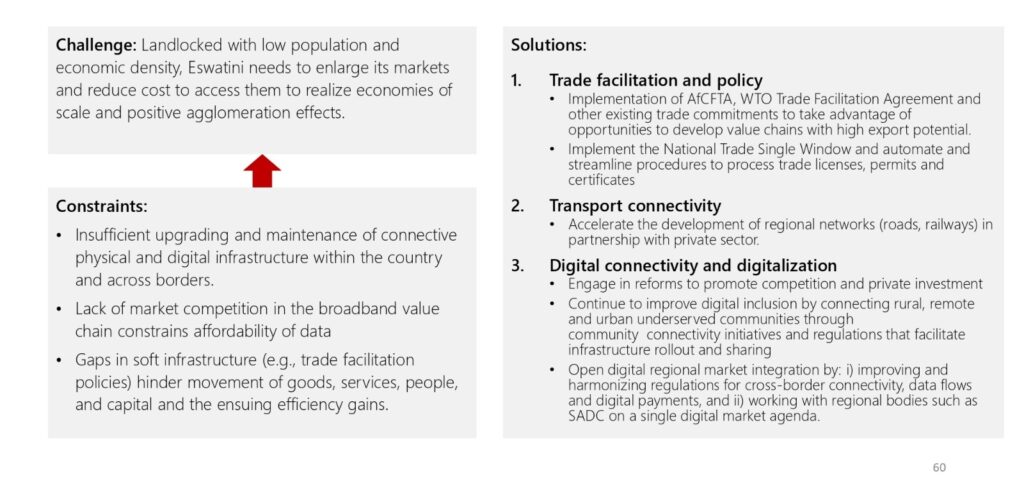
By Phiwa Sikhondze
A World Bank Group Report titled Eswatini Country Economic Memorandum 2024: In Search of the Drivers of Inclusive Economic Growth, has identified transport and digital development as one of the drivers necessary for the country’s economic progress.
The report by the World Bank Group report intends to be an input into the government’s strategic vision and policymaking to help move Eswatini closer to its ambitious objective of boosting inclusive growth and becoming an upper middle-income economy.
The comprehensive report emphasizes the necessity for significant investments in transportation infrastructure and digital integration to boost competitiveness and innovation. Transport infrastructure and digital development are identified as crucial for Eswatini’s future, indicating the critical role these sectors play in facilitating trade, reducing costs, and enhancing connectivity.
The report underscores the need for substantial investments in road and other transport networks to support economic activities.
The World Bank report advocates for significant investments in road and other transport networks, which are deemed essential for economic activities. The report elaborates on how efficient transport systems can boost productivity by minimizing the time and cost of moving goods and services. It recognizes efficient transport systems as essential for reducing trade costs and increasing market access, pointing to the economic benefits of well-developed transport infrastructure.
In addition to transport, the report stresses the importance of digital development. Digital integration is highlighted as a key factor in promoting innovation and competitiveness.
The report recognizes the transformative power of digital technologies for its potential to create new business models, improve service delivery, and broaden access to information and markets.
It suggests that by embracing digital development, Eswatini can position itself to adapt to global economic trends and technological advancements.
The World Bank’s recommendations for Eswatini include expanding and upgrading the road network, investing in digital infrastructure, and fostering policies that encourage the adoption of digital technologies.
The report also acknowledges challenges such as the need for improved coordination among government agencies, securing funding for infrastructure projects, and creating regulatory frameworks that support innovation.
According to the report, by focusing on transport and digital development, Eswatini can create a more dynamic and interconnected economy. These efforts will help the country adapt to global economic trends and technological advancements.
The International Bank acknoledges that Eswatini faces significant challenges in its transport sector, primarily due to insufficient upgrading and maintenance of connective physical infrastructure both within the country and across its borders.
This lack of adequate infrastructure hampers the efficient movement of goods, services, and people, which is critical for economic growth and regional integration. The report highlights that the country’s transport systems are essential for reducing trade costs and increasing market access.
However, without substantial investments in road networks and other transport facilities, these systems remain inefficient, leading to higher operational costs and longer transit times. Additionally, gaps in soft infrastructure, such as trade facilitation policies, further hinder the seamless movement of goods and services, preventing Eswatini from fully capitalizing on regional and international trade opportunities.

The digital landscape in Eswatini also faces considerable obstacles that hinder its potential to drive innovation and economic development. One of the primary issues is the lack of market competition in the broadband value chain, which significantly constrains the affordability of data. This makes it challenging for individuals and businesses to access high-quality Internet services, limiting their ability to participate in the digital economy.
Moreover, insufficient upgrading and maintenance of digital infrastructure exacerbate these issues, as the existing systems are often outdated and unable to meet the growing demands for connectivity. These infrastructural deficits, combined with regulatory and policy gaps, prevent the effective implementation of digital solutions that could enhance service delivery, improve business operations, and foster greater economic inclusivity.
The World Bank’s recommendations also highlight the importance of capacity building and skill development. Emphasizing the importance of human capital, the report calls for educational programs and training initiatives focused on digital skills. A skilled workforce is considered vital for leveraging technology and driving economic growth.
